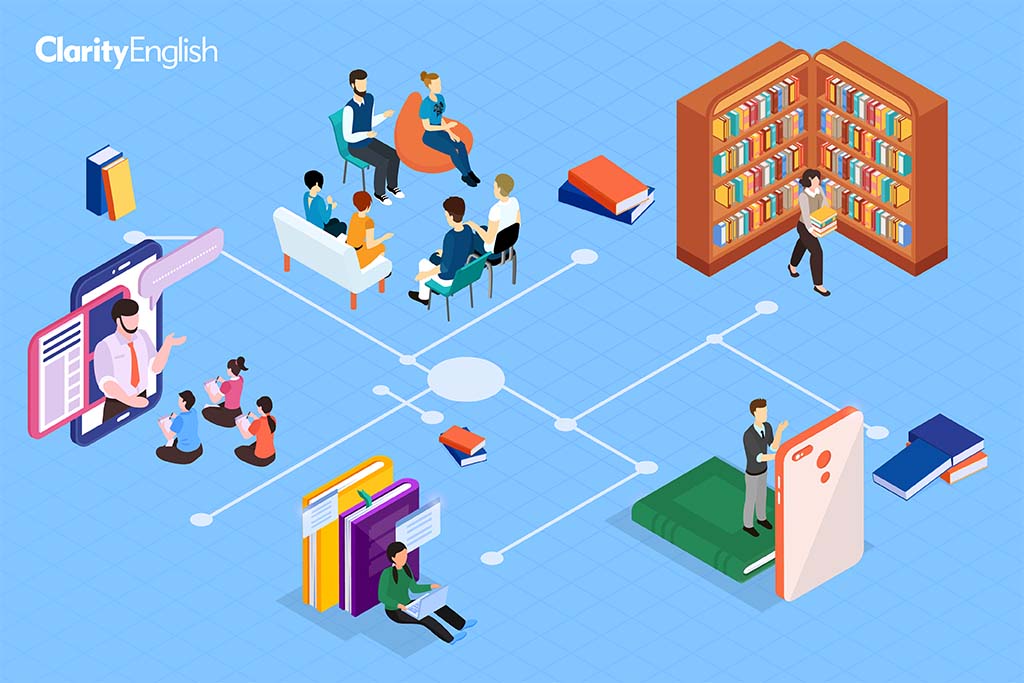In April 2022, Kateryna, a 24 year-old marketing student from Kyiv, arrived in London for the first time after fleeing the war in Ukraine. She knew some basic English from watching American TV shows back home, but not enough to feel confident interacting with all the new people around her. She made finding a way to improve her English one of her priorities. For refugees and asylum seekers in the UK, Australia and Canada, learning English is a crucial step towards rebuilding their lives and finding their feet in their new communities.
Research shows a correlation between levels of English and employment rates, independence and happiness – a positive feedback loop that benefits not only the individual, but society as a whole (Learning and Work Institute, 2021). Unfortunately, in the UK, as well as other English-speaking countries, there are significant obstacles to accessing adequate ESOL instruction. In this post, I’d like to lay out the most significant of these barriers and to suggest how we can overcome them.
First, let’s look at the impact of budget cuts. Focusing on the UK, the Adult Education Budget, which funds most ESOL courses in the UK, has been cut back from around £212M in 2008 to £105M in 2018 (Refugee Action, 2019). The cuts limit the length of time learners can secure a place in a funded class (12 months) and the type of classes offered (in-person with very few exceptions for online classes) (RESET, 2021). But before they even set foot in a classroom the waiting list to start learning can be as long as two years in some areas. These restrictions disproportionately disadvantage women and girls who perform caretaking duties and therefore can’t travel into classes, and those with mobility issues. Learners wanting to gain an accredited English qualification by City and Guilds or ESOL Skills for Life for job applications can have their resettlement hopes prolonged by the two year waitlist.
But that’s not to say all hope is lost. Where the government falls short, communities step up. There are amazing local organisations and charities that provide options for those in need. In London, local organisations like the Lewisham Refugee and Migrant Network provide a range of functional language classes to those in the local area. The same goes for the Afghanistan and Central Asian Association, which was started by Dr Nasimi MBE, a refugee from Afghanistan himself. There are also free classrooms and learning centres that are provided by English for Action and local libraries like Woolwich Centre Library.
For those in more rural areas, some of these options are available but not as extensively as in the cities. The search for alternative solutions starts here. For example, public libraries have a great potential to serve as hubs for self-access centres, providing desktop and mobile access to online learning materials. This approach enables learners to engage in independent learning, access educational resources, and develop their language skills while awaiting placement in accredited classes. By expanding the availability of resources in libraries, we can bridge the gap and offer learning opportunities to those currently facing limited access.
Additionally, while waiting for funded and accredited classes, learners can focus on functional language skills they can use straight away. By prioritising language that is relevant to daily life and integrating it into learners’ experiences, we can enhance their ability to communicate effectively in various contexts. This approach prepares them for practical interactions and promotes faster integration into society. These resources, if available and accessible on mobile devices, allow learners to bring their lessons and learning home with them and open up more opportunities for structured practice.
Perhaps in the future, the UK can draw inspiration from international resettlement programs like Australia’s Adult Migrant English Program (AMEP). New legislation in Australia has expanded the criteria for who can access the program, making it much more inclusive . Their course has online modules, a volunteer program and funded taught classes available in each state. Learners can continue to access English classes until they reach vocational English (beyond the previous limit of 510 hours) and most designated centres have free childcare facilities for children under school age.
It is crucial for society to recognise the potential of ESOL learners, as their improved language skills not only enhance their own livelihoods but also contribute to the broader social and economic well-being of the communities they become part of. Kateryna is still living in London and has completed her first English course at a local Adult Education College. She still hopes to return to Ukraine but for now is happy to have new experiences and friends from her English course.
At Clarity, we have just released Arrivals in English, a program for Pre-A1 learners of English. You can try the British English version now on our website. If you have any enquiries, please don’t hesitate to get in touch at info@clarityenglish.com
References
Breaking Barriers (2023). Facts about refugees in the UK. Breaking Barriers. https://breaking-barriers.co.uk/our-impact/refugee-asylum-facts/
Fox, C. (2023). How to ensure ESOL meets learners’ and employers’ needs. FE Week. https://feweek.co.uk/how-to-ensure-esol-meets-learners-and-employers-needs/
Department for Levelling Up, Housing and Communities, &; Casey, L., The Casey Review – A review into opportunity and integration 94–99 (2016). London; Department for Levelling Up, Housing and Communities.
Learning and Work Institute (2019) Progressing resettled refugees into employment. National Learning and Work Institute (England and Wales)
Australian Government Department of Home Affairs (2023) Adult Migrant English Program (AMEP) About the Program. https://immi.homeaffairs.gov.au/settling-in-australia/amep/about-the-program#:~:text=you%20can%20now%20access%20unlimited,until%20you%20reach%20vocational%20English
RESET (2021) ESOL for Community Sponsorship supported refugees. RESET communities for refugees. https://training-resetuk.org/wp-content/uploads/2021/11/ESOL-briefing-for-Community-Sponsorship-Groups.pdf
Refugee Action (2016) Let refugees learn. https://www.refugee-action.org.uk/wp-content/uploads/2016/11/letrefugeeslearnfullreport.pdf

